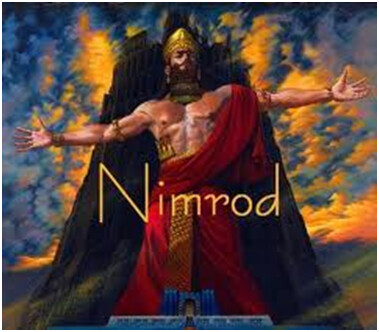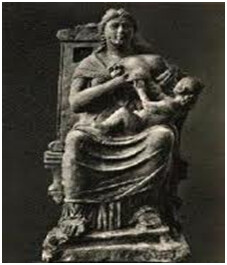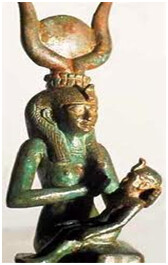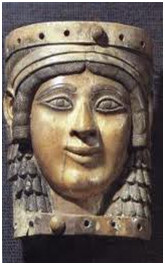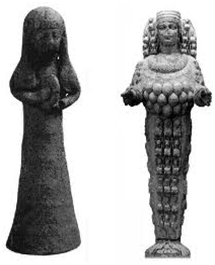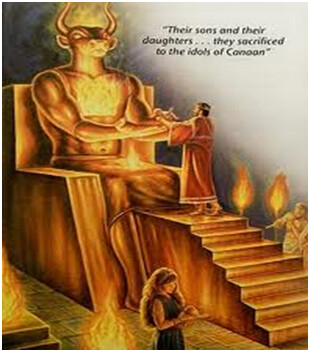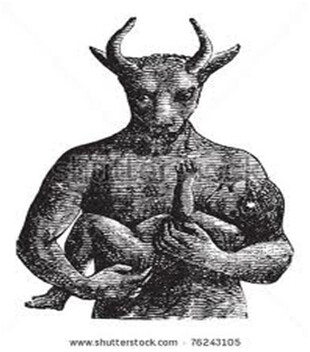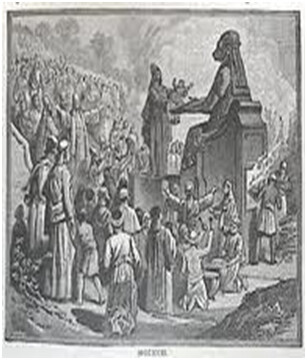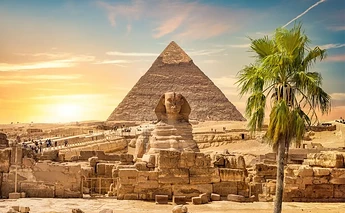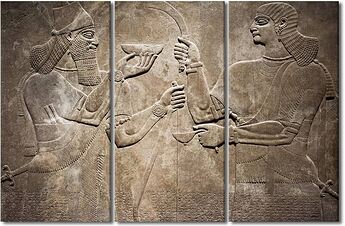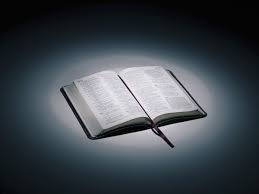We begin with the holy day Easter, the Pagan Passover
The origin of Pagan Easter
Easter is not simply one feast among others, but “Feast of feasts,” the “Solemnity of solemnities,” just as Eucharist is “Sacrament of sacraments” (the Great Sacrament).
St. Athanasius calls Easter “the Great Sunday,” and the Eastern Churches call Holy Week “the Great Week.” The mystery of the Resurrection, in which Christ crushed death……
(Catechism of the Catabolic Church, Part 2, Sec. 1, Chapter 2, Article 1, #1169)
The origin of so call Easter came from ancient paganism, after the days of Noah
The descendants of Ham were Cush, Mizraim, Put, and Canaan.
The sons of Cush were Seba, Havilah, Sabtah, Raamah, and Sabtechah; and the sons of Raamah were Sheba and Dedan.
Cush begot Nimrod; he began to be a mighty one on the earth.
He was a mighty hunter before the Lord; therefore it is said, “Like Nimrod the mighty hunter before the Lord.”
And the beginning of his kingdom was Babel, Erech, Accad, and Calneh, in the land of Shinar.
From that land, he went to Assyria and built Nineveh, Rehoboth Ir, Calah, and Resen between Nineveh and Calah (that is the principal city).
Mizraim begot Ludim, Anamim, Lehabim, Naphtuhim,
Pathrusim, and Casluhim (from whom came the Philistines and Caphtorim).
Canaan begot Sidon his firstborn, and Heth; the Jebusite, the Amorite, and the Girgashite;the Hivite, the Arkite, and the Sinite; the Arvadite, the Zemarite, and the Hamathite. Afterward the families of the Canaanites were dispersed.
And the border of the Canaanites was from Sidon as you go toward Gerar, as far as Gaza; then as you go toward Sodom, Gomorrah, Admah, and Zeboiim, as far as Lasha.
These were the sons of Ham, according to their families, according to their languages, in their lands and in their nations.
And children were born also to Shem, the father of all the children of Eber, the brother of Japheth the elder.
The sons of Shem were Elam, Asshur, Arphaxad, Lud, and Aram.
The sons of Aram were Uz, Hul, Gether, and Mash.
Arphaxad begot Salah, and Salah begot Eber.
To Eber were born two sons: the name of one was Peleg, for in his days the earth was divided; and his brother’s name was Joktan. Joktan begot Almodad, Sheleph, Hazarmaveth, Jerah,
Hadoram, Uzal, Diklah,
Obal, Abimael, Sheba,
Ophir, Havilah, and Jobab. All these were the sons of Joktan.
And their dwelling place was from Mesha as you go toward Sephar, the mountain of the east.
These were the sons of Shem, according to their families, according to their languages, in their lands, according to their nations.
These were the families of the sons of Noah, according to their generations, in their nations; and from these the nations were divided on the earth after the flood. Gen 10:6-32 (NKJV)
After the Great Flood, Nimrod establish idolatry on the Earth, after his death he was crown as the sun god, widow Semiramis was call “the Queen of Heaven. She was called many names, to the Egyptians she was Isis, to the Babylonians she was Belts, consort to a god named known as Bel, to the Canaanites she was Astarte, the Assyrians she was Ishtar.
Semiramis & Nimrod; Isis, Belts, Astarte, Ishtar
The worship of these goddesses involved occult fertility practice, which is and was abomination, even when the Israelites went into Apostasy
The Great Apostasy.
Now the Spirit expressly says that in latter times some will depart from the faith, giving heed to deceiving spirits and doctrines of demons,
speaking lies in hypocrisy, having their conscience seared with a hot iron, forbidding to marry, and commanding to abstain from foods which God created to be received with thanksgiving by those who believe and know the truth.
For every creature of God is good, and nothing is to be refused if it is received with thanksgiving; for it is sanctified by the word of God and prayer. 1 Tim 4:1-5 (NKJV)
Now, brethren, concerning the coming of our Lord Jesus Christ and our gathering together to Him, we ask you, not to be soon shaken in mind or troubled, either by spirit or by word or by letter, as if from us, as though the day of Christ had come.
Let no one deceive you by any means; for that Day will not come unless the falling away comes first, and the man of sin is revealed, the son of perdition, who opposes and exalts himself above all that is called God or that is worshiped, so that he sits as God in the temple of God, showing himself that he is God.
Do you not remember that when I was still with you I told you these things?
And now you know what is restraining, that he may be revealed in his own time.
For the mystery of lawlessness is already at work; only He who now restrains will do so until He is taken out of the way.
And then the lawless one will be revealed, whom the Lord will consume with the breath of His mouth and destroy with the brightness of His coming.
The coming of the lawless one is according to the working of Satan, with all power, signs, and lying wonders, and with all unrighteous deception among those who perish, because they did not receive the love of the truth, that they might be saved.
And for this reason God will send them strong delusion, that they should believe the lie,
that they all may be condemned who did not believe the truth but had pleasure in unrighteousness. 2 Thess 2:1-12 (NKJV)
The Apostasy of Israel "Set the trumpet to your mouth! He shall come like an eagle against the house of the LORD, Because they have transgressed My covenant And rebelled against My law.
Israel will cry to Me, ‘My God, we know You!’
Israel has rejected the good; The enemy will pursue him.
"They set up kings, but not by Me; They made princes, but I did not acknowledge them. From their silver and gold They made idols for themselves-- That they might be cut off.
Your calf is rejected, O Samaria! My anger is aroused against them-- How long until they attain to innocence?
For from Israel is even this: A workman made it, and it is not God; But the calf of Samaria shall be broken to pieces.
"They sow the wind, And reap the whirlwind. The stalk has no bud; It shall never produce meal. If it were to produce, Aliens would swallow it up.
Israel is swallowed up; Now they are among the Gentiles Like a vessel in which is no pleasure. For they have gone up to Assyria, Like a wild donkey alone by itself; Ephraim has hired lovers.
Yes, though they have hired among the nations, Now I will gather them; And they shall sorrow a little Because of the burden of the king of princes.
"Because Ephraim has made many altars for sin, They have become for him altars for sinning.
I have written for him the great things of My law, But they were considered a strange thing.
For the sacrifices of My offerings they sacrifice flesh and eat it, But the LORD does not accept them. Now He will remember their iniquity and punish their sins. They shall return to Egypt.
“For Israel has forgotten his Maker, And has built temples; Judah also has multiplied fortified cities; But I will send fire upon his cities, And it shall devour his palaces.” Hosea 8:1-14
New gods

They chose new gods; Then there was war in the gates; Not a shield or spear was seen among forty thousand in Israel.
My heart is with the rulers of Israel who offered themselves willingly with the people. Bless the Lord!
Judges 5:8-9
Deuteronomy 32:17



